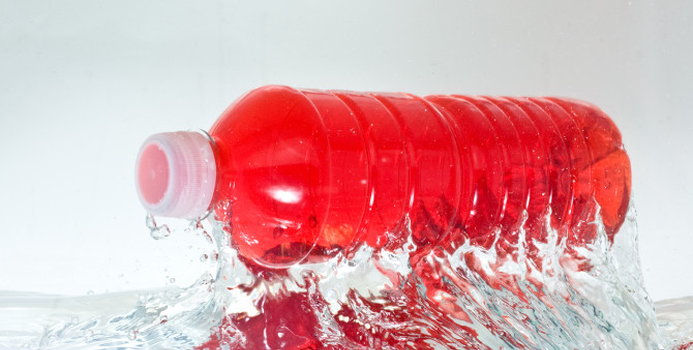A cool sports drink goes hand-in-hand with a hot summer day or a long, grueling workout. However, these popular drinks come with a hefty downside. Sports drinks contain high amounts of sodium, which are thought to replenish the electrolytes lost while sweating. However, very few exercisers work out hard enough that a sports drink may be necessary.
Additionally, the leading brands of sports drinks typically contain as much as two-thirds the sugar of regular sodas. Many varieties also contain high-fructose corn syrup or artificial sweeteners, flavorings and food coloring. Therefore, it's important to do a little digging before stocking up.
Gatorade
Gatorade, the long-standing leader in hydration drinks, launched from humble beginnings at the University of Florida, and has evolved into one of the world's leading sport drinks. However, this standard beverage is laden with unnecessary sugar and sodium. One 12 ounce serving of Gatorade's Thirst Quencher contains 21 grams of sugar. However, because a regular bottle contains 32 ounces, you are actually consuming 56 grams of sugar, about one-fifth the recommended daily amount of total carbohydrates and about twice the recommendation for added sugar consumption. In addition, Gatorade boasts almost twice the amount of sodium as other leading brands, working to stimulate the thirst mechanism.
Powerade
Packed with calories and sugar, a 32 ounce bottle of Powerade contains about 300 calories and is also loaded with sodium. While Gatorade is comprised mainly of water and sucrose, Powerade's second ingredient is high-fructose corn syrup, followed later by both natural and artificial flavorings. While its sweet taste might encourage you to drink more to properly rehydrate, consuming such large quantities can easily add up the calories, sugar and sodium to unnecessary and sometimes detrimental levels.
Vitamin Water
The main selling points of Glaceau Vitaminwater and its competitors, like Propel and SoBe Life Water, are the added vitamins and electrolytes in each bottle. However, hiding behind those added vitamins is a large dose of sugar. Most varieties pack about 33 grams (more than 6 teaspoons) of sugar. These varieties of sports drinks are also a big calorie trap - an average bottle contains about 2.5 servings, making it easy to drink upwards of 100 calories, just shy of the calories in a regular soda. As for the vitamins, Vitamin Waters tend to focus on B vitamins and vitamin C, all of which are water-soluble, meaning our bodies do not store them. Once you consume what your body needs, the rest is discarded, providing no extra benefits.
Overall, while the athletic "benefits" of consuming sports drinks are well touted in the media, their actual effectiveness is less than certain. At the end of the day, plain old water is still the standard go-to when it comes to rehydrating after a workout.

Sarah Dreifke is a freelance writer based in DeKalb, IL with a passion for nutrition education and the prevention of chronic disease. She holds a Bachelor of Science in both Dietetics and Life Sciences Communication from the University of Wisconsin-Madison. Currently, she is working towards a combined Master's Degree in Nutrition and Dietetics as well as a dietetic internship at Northern Illinois University.



